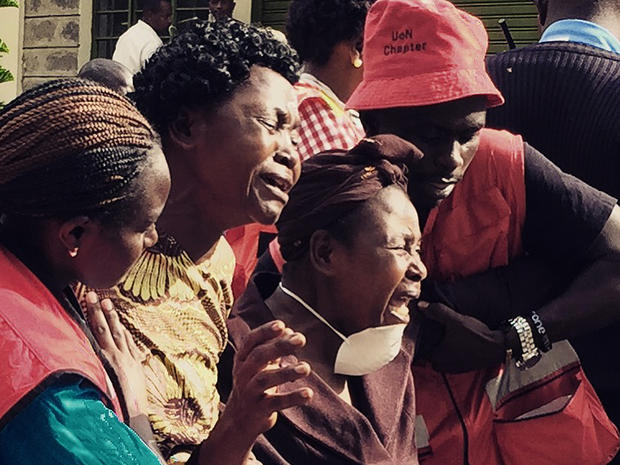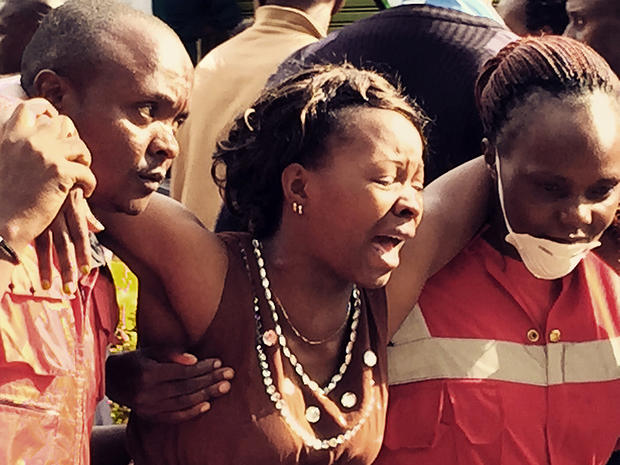Islamic extremists threaten more attacks after massacre
GARISSA, Kenya -- Somalia's Islamic extremist group al-Shabaab on Saturday warned of more attacks in Kenya like the assault on Garissa University College in which 148 people were killed.
"Kenyan cities will run red with blood," said al-Shabaab according to the SITE intelligence monitoring group.
The Islamic militants said the attack on Garissa college was in retaliation for killings carried out by Kenyan troops fighting the rebels in Somalia.
"This will be a long, gruesome war of which you, the Kenyan public, are its first casualties," said the statement, issued on Shabaab-affiliated websites and Twitter accounts
"No amount of precaution or safety measures will be able to guarantee your safety, thwart another attack or prevent another bloodbath," said the al-Shabaab statement.
Daisy Achieng repeatedly heard the attackers single out Christians in Thursday's attack.
"They were being asked a few questions from the Quran," she told CBS News' Debora Patta. "If you get it correct, you were spared. If you get it wrong, you were shot on the spot."
CBS News found Achieng at a makeshift shelter set up for the shell-shocked victims of the siege. At one point, she said she heard a phone ring. It was the mother of one of the students taken hostage.
"He took the phone from her and told the lady that 'I'm going to kill your child right now, so know it's the last time you're going to hear her voice, so hear me kill her,' and I heard a gunshot," Achieng said.
The bodies of many of those killed in Garissa have been transported to the capital, Nairobi, where grieving Kenyans gathered to view the remains of family members.
CBS News producer Sarah Carter said people lined up at one door to the Chiromo mortuary and waited to enter and see if their loved ones were among the dead. Carter said it was mainly parents there to identify their slain children, and the pain on their faces and in their cries as they emerged from the other end of the mortuary was clear to see.
Five people have been arrested on suspicion of involvement in the Garissa attack, a Kenyan official said.
Kenyan security agencies arrested three people trying to cross into Somalia, said Interior Ministry spokesman Mwenda Njoka in a Twitter post. He said the three are associates of Mohamed Mohamud, also known as Dulyadin Gamadhere, a former teacher at a Kenyan Madrassa Islamic school who authorities say coordinated the Garissa attack. Kenyan authorities have put a $220,000 bounty for information leading to Gamadhere's arrest.
Two other suspects were arrested at Garissa college.
A survivor of the killings at Garissa University College was found on Saturday, two days after the attack by Islamic extremists killed 148 people.
Cynthia Cheroitich, 19, told The Associated Press from her hospital gurney that she hid in a wardrobe and covered herself with clothes, refusing to emerge even when some of her classmates came out of hiding at the demands of the gunmen from the al-Shabaab group.
She was rescued shortly before 10 a.m., according to Kenyan officials.
Cheroitich said she didn't believe that rescuers urging her to come out of her hiding place were there to help, suspecting at first that they were militants.
"How do I know that you are the Kenyan police?" she said she asked them.
Only when Kenyan security forces had one of her teachers appeal to her did she come out, she said.
"I was just praying to my God," Cheroitich, a Christian, said of her ordeal.
Cheroitich appeared tired and thirsty, sipping on yoghurt and a soft drink, but otherwise seemed in good health.
She said she drank a body lotion because she was so thirsty and hungry while in hiding.
Authorities displayed the bodies of the alleged attackers before about 2,000 people in a large open area in central Garissa. The bodies lay on the bed of a pickup truck that drove slowly past the crowd, which broke into a run in pursuit. Soldiers monitored the crowd. There was shouting and clouds of dust rose as the vehicle left the area.
Kenyan authorities initially said the attackers had been strapped with explosives that went off like bombs when they were shot, but investigators later said there were no suicide vests. The four bodies shown Saturday had wounds but were intact.
Spectator Yusuf Mohamed applauded the display, saying authorities wanted to "win the hearts of the people" and clear any doubts that the attackers had been killed.

